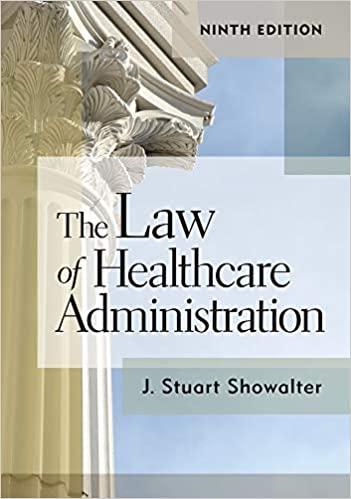Question
AL Minor & Associates, Inc. v. Martin (Pagnatarro, 17 th Ed, p. 319) AL Minor & Associates, Inc. (AMA) is an actuarial firm that designs
AL Minor & Associates, Inc. v. Martin (Pagnatarro, 17 th Ed, p. 319) AL Minor & Associates, Inc. (AMA) is an actuarial firm that designs and administers retirement plans and employs several "pension analysts" who work with approximately 500 clients. Al Minor Jr., who founded AMA in 1983 and serves as its president and sole shareholder, developed AMA's clientele, for which the firm maintains a confidential list. In 1998, AMA hired Martin as a pension analyst but did not require him to sign either an employment contract or a noncompete agreement. In 2002, while still employed by AMA, Martin organized his own company, Martin Consultants, L.L.C., with the purpose of providing the same type of services as AMA. In 2003, he resigned from AMA and, without taking any documents containing confidential client information, successfully solicited 15 AMA clients with information from his memory. After learning of Martin's competing business, AMA filed the instant action against him for monetary and injunctive relief, claiming that he had violated Ohio's Trade Secrets Act by using confidential client information to solicit those clients . . . . In this court, Martin asserts that a client list memorized by a former employee cannot be the basis of a trade secret violation. . . .
true/false questions
1. The confidential client list developed by Al Minor, Jr., qualifies as a trade secret and may be protected as such for as long as its confidentiality is protected.
2. Martin cannot be said to misappropriate the AMA trade secret client list because he did not take any documents containing confidential client information when he left his employment with AMA.
3. AMA's client list constituted a trade secret and the fact that Martin had memorized that client list before leaving AMA does not change its status as a trade secret or remove it from the protection of the UTSA.
4. AMA's client list would not satisfy the definition of a trade secret if it contained information that is available to the public via the Internet.
5. AMA is not entitled to injunctive relief ordering Martin not to solicit customers on the AMA's customer list, because he did not sign a either an employment contract or a noncompete agreement.
Step by Step Solution
There are 3 Steps involved in it
Step: 1

Get Instant Access to Expert-Tailored Solutions
See step-by-step solutions with expert insights and AI powered tools for academic success
Step: 2

Step: 3

Ace Your Homework with AI
Get the answers you need in no time with our AI-driven, step-by-step assistance
Get Started


